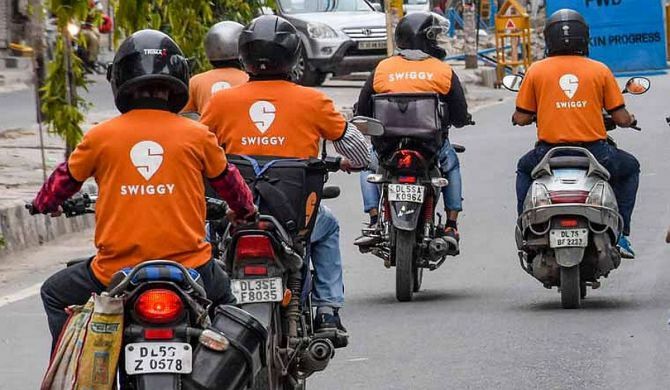On the cusp of launching its Rs 11,327 crore initial public offering (IPO) next week, food and grocery delivery major Swiggy believes quick commerce to be its future growth engine and anticipates that it will outpace its core food delivery business over the next five years.

Currently, the quick commerce business of Swiggy — backed by Prosus and SoftBank — is 40 per cent of the size of its food delivery revenues.
“Quick commerce addresses a far larger total addressable market (TAM) and is growing faster than the food delivery market,” said Sriharsha Majety, Swiggy’s co-founder and CEO, on the sidelines of an event to announce the IPO.
“It is fair to assume that quick commerce will surpass food delivery at some point in the next five years.”
If successful, Swiggy’s IPO would rank as the second-largest of the year and the sixth-largest in India’s history.
The offering includes a fresh issue of Rs 4,499 crore and a secondary share sale of 175 million shares by existing shareholders.
Opening on November 6, the price range is set at Rs 371-390 per share, with a top valuation projected at about Rs 87,300 crore — behind its listed rival Zomato, currently valued at Rs 2.2 trillion.
The fresh capital raised will be directed to expand Swiggy’s dark store network, enhance technology and cloud infrastructure, boost brand marketing, and fuel inorganic growth.
Of the funds, Swiggy plans to channel Rs 1,178.7 crore specifically into its quick commerce business — a jump from the Rs 982 crore cited in its initial IPO prospectus.
Majety described the journey to IPO as a pivotal chapter in Swiggy’s story.
“Over these years, we have got so many investors and so many employees to join a certain dream…of building something great.
"And then making it all real has been a surreal journey,” he remarked.
Amitesh Jha, CEO of Swiggy’s Instamart, elaborated on the strong engagement seen in quick commerce, pointing to its high-frequency nature and potential to drive cross-category purchases.
“Q-commerce is a very broad category… you cannot have just 2-3 categories under it.
"It is also a very high frequency category.
"This means that you are engaging with the platform much more than any other platform, your propensity to buy other categories is also very high,” he said.
Like Zomato, Swiggy plans to adopt an experimental approach to quick commerce, as Majety indicated that the segment demands ongoing innovation to align with evolving consumer preferences.
"Experimentation is going to be the key. We really do not know what consumers want, how fast they want, and how sustainable these businesses and categories are.
"So all of the players and participants will continue piloting new category launches, and so will we,” he said.
Responding to regulatory scrutiny around quick commerce, which some fear could disrupt traditional kirana stores, CFO Rahul Bothra emphasised Swiggy’s compliance and positive contributions to the ecosystem.
“Since Covid-19, we have been in touch with regulators and demonstrated to them the benefits of the ecosystem.
"For instance, in the farm to fork, we have eliminated the middleman and we have been able to get fair pricing to the farming community. Our 53 warehouses and hundreds of dark stores are generating jobs.”
Notably, Swiggy is set to become the first Indian company to launch an issue after having opted for a confidential IPO filing.
Explaining this decision, Bothra said, "Globally, most large markets and regulators provide the confidential route for filing, especially in a competitive sector.
"The reason: The (offer) document has a lot of company information and strategies, and overall breakdown of the numbers.
"We did not want them to go public before they needed to be. Also, new-age companies go through a lot of scrutiny, which means that there is a certain amount of uncertainty around the timing of the approval itself."
This IPO includes a secondary share sale of Rs 6,828 crore by 10 investors, including Tencent, Accel India, and Apoletto Asia, with acquisition costs per share ranging from Rs 11.2 to Rs 165.5.












 © 2025
© 2025